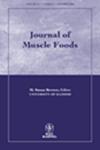GELATION OF FISH MUSCLE USING MICROBIAL TRANSGLUTAMINASE AND THE EFFECT OF SODIUM CHLORIDE AND PH LEVELS
Abstract
ABSTRACT
Texturizing products by protein setting reinforced by Microbial Transglutaminase (MTGase), which forms covalent bonds between proteins, makes it possible to obtain minimally processed products in a raw state that can be commercialized in fresh or cooked products. In the present paper, microbiological analysis determined that restructured products would have a shelf life of up to 14 days (at 2C) if the pH of the samples were 6.0. The physicochemical properties of restructured fish muscle with added MTGase (0.5–1.0%) set at 5C for 48 h at different pH (6 and 6.8) and sodium chloride concentrations (0.5, 1.5 and 4.0%) were studied. pH had the greatest effect on the raw product's mechanical properties at low or medium NaCl concentrations, while at high NaCl concentrations, no differences between either pH were found. More than 0.5% MTGase had very little effect on the mechanical properties of restructured muscle.
PRACTICAL APPLICATIONS
The main aim is to establish bases for using fish fillet trimmings and minced muscle to prepare restructured products that can be commercialized in a raw state. One possibility is to process this kind of products with technologies normally used in whole fish muscle such as smoked fish fillets, carpaccios or marinated products. In addition, these raw restructured products can be commercialized to be cooked as a normal fresh fish fillet or pieces of fillet in a variety of preparations. Nowadays, most restructured products are thermically treated and this limits their consumption. One way of achieving raw restructured products is to use Microbial Transglutaminase to bind small pieces of the muscle. Knowledge of the effect of the combined action of salt and Transglutaminase on fish muscle would be important to develop products with the right consistence. It would also be important for these products to have a low pH to extend their shelf life.

 求助内容:
求助内容: 应助结果提醒方式:
应助结果提醒方式:


